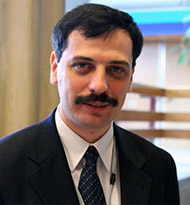
Semion Zhutovsky
, Assoc. Prof.- 972-4-8292365
- semionzh@technion.ac.il
- Personal Website
- Rabin Building, Room 823

Visit Research Laboratory website
Laboratory of alternative cementitious materials was founded at National Building Research Institute (NBRI) by Dr. Semion Zhutovsky at the Technion in 2017 to provide infrastructure and technical basis for the innovative research in the area of cementitious materials that continues over several decades in NBRI since its establishment. In addition to the existing proficiency of NBRI in studying mechanical and durability properties of cementitious materials, the laboratory provides capability and know-how in the research of cement production technology, optimization, and development.
The major topics of the current research conducted in the laboratory include recycling of concrete waste fines into new Portland cement clinker, producing traditional Portland cement from alternative materials to reduce CO2 emissions, self-healing cementitious materials, the study on optimization of supplementary cementitious materials by means of various activation techniques and their different combinations in ternary and quaternary blends, as well as producing alternative binders with reduced energy consumption and carbon footprints such as belite-rich cement, calcium-sulfate-aluminate cement, and belite-ye’elimite-ferrite cement.